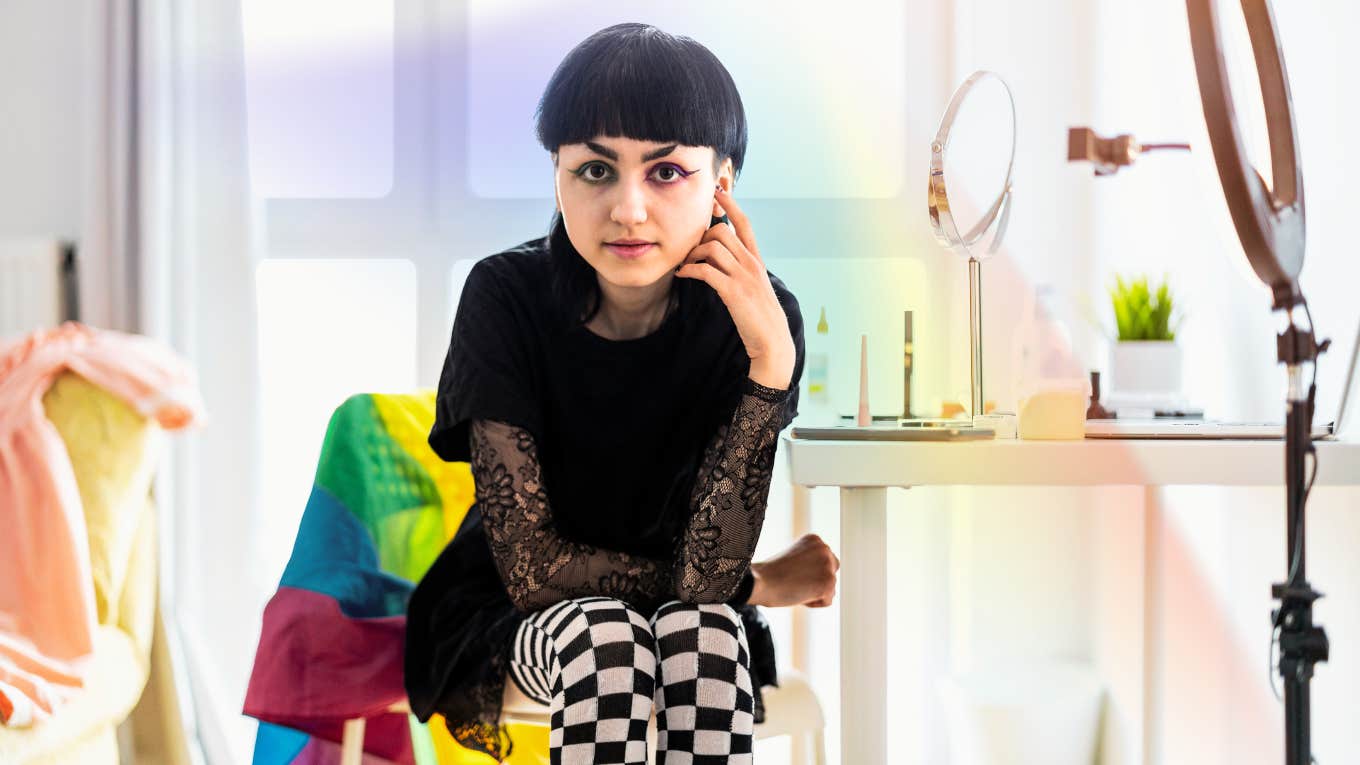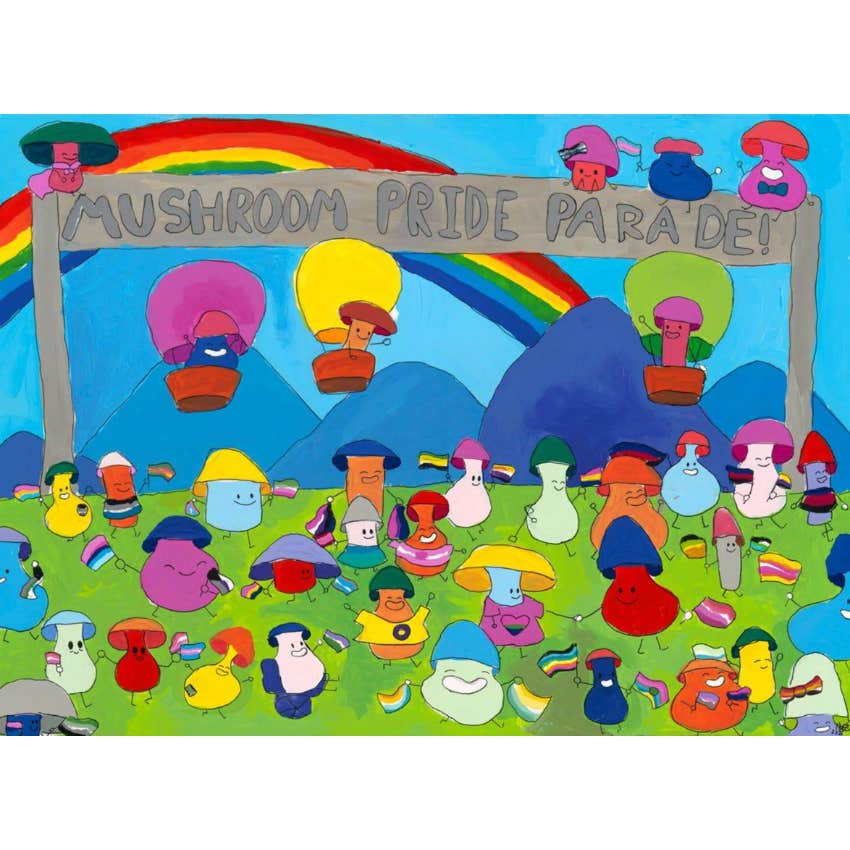My Child Came Out As Genderfluid 3 Years Ago — 10 Things I Wish I Knew Then
10 things every parent should do when their child comes out.
 PIKSEL | Canva
PIKSEL | Canva It’s a Monday morning like any other, a year into a pandemic that’s kept me working and my kids schooling from home, when my youngest, nearly 11, walks over to me at my desk and hands me a note — and changes everything.
“Hi, I am genderfluid…” the note begins.
And just like that, my daughter suddenly is no longer a daughter. Or a her. Or Annika.
They are Nico.
Three years later, it’s still hard to describe what it felt like to get that note. I was so proud of my child’s newfound assertiveness and confidence. My heart swelled knowing they felt safe enough to confide in me. But also, it hurt to know my child had been wrestling with their identity without me knowing. And it was uncomfortable at first — when they picked their own name in favor of the one we’d selected with such care and love.
I knew better than to share these heartaches with my child. I simply told them I loved them, thanked them for telling me, and posted the news to Facebook, as they’d asked me to do. Then I tried on the new name. Nico. I liked it. Even as I felt a little pang for what I knew I had to let go and a smidge of reservation about what lay ahead in parenting my newly genderfluid child.
I had some idea of how things would go. We live in a liberal blue bubble of a city. Rainbow flags hang in every cafe. Many of Nico’s peers were on gender journeys of their own. I didn’t have concerns for Nico’s safety, thank goodness. And for the most part, my hunch was correct. I posted Nico’s message on Facebook to universal support from our friend network.
I know how lucky we are.
As a result of Nico coming out so visibly, I became a bit of a beacon for other parents as their kids announced gender changes. And I’ll be honest, in those early days, I had some misgivings about my abilities, let alone how to advise others. I felt like I was parenting without a roadmap. I took a few wrong turns, but with the support of our family and friends, I’d like to think we’ve managed pretty well on this journey and even learned a few things along the way.
Now, over three years later… well, sometimes I still have misgivings. But at 14-years-old, Nico is flourishing. They’ve journeyed all over the gender and sexuality spectrum — genderfluid, nonbinary, neoboy, lesbian, bisexual — and now say “I don’t care” when asked their preferred pronouns. So I flip between “she” and “they,” with her consent. I consider this gender fluidity a foundational part of Nico’s coming of age, and through it all, I’ve seen them grow into a more self-assured and empathetic person. They’ve learned to stand up for themselves and how to champion and support others.
And as their mom, I don’t think I could ask for more.
 Mushroom Pride Parade. Acrylic painting by Nico, age 12, shortly after they came out | Photo by author.
Mushroom Pride Parade. Acrylic painting by Nico, age 12, shortly after they came out | Photo by author.
I make no claims to know all the answers. But after three years of lived experience, I’ve gained some wisdom that may be helpful for other families going through similar circumstances.
Here are 10 things every parent should do when their child comes out:
1. Love your child, unconditionally
Nothing is more important to the mental health and well-being of your trans, nonbinary, or otherwise gender-variant child than that they have your unconditional love and support. Listen to them, hear them, support them, and love them — no matter what.
2. Know that this is normal
To us, changing one’s gender may feel strange, fraught even. But with Gen Z and Gen Alpha, gender and name transitions are a norm. Of course, this varies by location. But according to a 2024 Public Religion Research Institute report, nearly 30% of all Gen Z adults (ages 18–25) identify as LGBTQIA+, eclipsing all other generations. So if your child is gender nonconforming, they’re not an outlier. To them, this is just normal.
3. It’s OK to have fears or doubts
Or confusion, sadness, or even anger. These are all normal feelings to have as you adapt as a parent. It’s always OK to feel your feelings. Just don’t share these negative emotions with your child. You can ask them questions — but don’t question them. Use open-ended, non-judgmental questions like, “Can you tell me more about what that means?” or “How can I support you?” But don’t be surprised if your child doesn’t have much to say, especially at first. Just keep your end of the conversation inquisitive and open when speaking with your child, and save your big feelings for your adult people. Your child has enough to manage.
4. Find your community
You’re the parent and need to process your feelings with other adults. Hopefully, you have open- and like-minded parenting friends. Lean on them. Because while the focus here is on our kids — as it should be — we parents are also going through a transition. It’s completely fine to mourn the loss of the son or daughter you thought you were raising. My friends and I lament how we miss endearing words like “daughter” or “the girls,” and we’ve joked about how we need a spreadsheet to keep track of all the changing names and pronouns in our kids’ friend group. Nothing beats having a support network. So, find your people — family, friends, an online community, a therapist, or all four.
5. Feel empowered to refuse one-way doors
Two of my older daughters’ friends requested top surgery when they first came out in seventh grade. Their parents said no. Nearly four years later, one still identifies as he/him, and the other now presents as female and identifies with she/they. Neither wants top surgery any longer. While it’s critical to listen to and honor what your child is going through, it’s also important to remember that you’re still the parent. Your job is to protect them as well as support them.
6. Know this may be temporary
Nico’s initial gender exploration was intensive and consuming. They dressed and created art in colors of the ever-changing gender flags they identified with at the moment. Now, she’s moved on to new obsessions: Taylor Swift, collecting records, and acting in school plays. And you know what? It’s all great. For some kids, identity changes will be lifelong. For others, they’re passing, a part of adolescence. And since we’re parenting on the front lines of a massive cultural shift, it may be years until we know the impact. All we parents can do is love and guide our kids through it all.
7. Learn the vocabulary
When Nico came out as genderfluid, I wrongly assumed it was the same as nonbinary. It’s not. Genderfluid means one’s gender identity is in a state of flux, changing regularly, while nonbinary denotes a fixed gender that’s neither male nor female. Nico’s intention was for me to ask them each day what their gender was. I didn’t do this, because I conflated the two terms. The nuances are important, and our kids need to know we understand their vocabulary around identity. The Human Rights Campaign, the Trevor Project, and PFLAG all have good glossaries to help you learn the terminologies. Do better than I did.
8. Check in ahead of checkups
Doctor visits can be fraught. Parenting tweens comes with enough surprises. You don’t need to get any from your pediatrician. After your child comes out, call ahead to let the office know. Make sure they’re prepared to call your child by their new name and pronouns; if they refuse, it’s time to consider a new doctor. If you can, talk to your pediatrician ahead of time about expectations. During Nico’s 11-year check-up, just a few weeks after they came out, our pediatrician offered them puberty blockers — without talking to me first. Spare yourself any awkward moments by contacting the office and setting expectations beforehand.
9. Be prepared to defend your child
But also be prepared to bite your tongue and let them speak for themselves — or choose not to. Part of parenting is around building resiliency. This is doubly true for a gender-nonconforming child. Check in with them to see if they’d like your support, or if they want to take the lead in informing others about their gender identity. Nico told me they’d rather speak for themself, and I was glad for it — because it was their identity to tell the world.
10. Trust your instincts
I wrote a story about how Nico was now using she/they pronouns. When I shared it on Facebook, I had a recently out, trans nonbinary acquaintance reply with strong opinions. They insisted I needed to keep using they/them pronouns for Nico because as a cishet woman, I couldn’t understand what my child needed. This person doesn’t know me well and doesn’t know my child at all. Nico and I have ongoing conversations on this topic. I may be cishet, but I am still Nico’s mom. And if they tell me what pronouns they want me to use, I trust their word. The world of gender nonconformity may be new to you as a parent, but your child is not. They’re still your same child. And you are still the expert on this child.
These days, Nico’s gender exploration has quieted — perhaps for good, or perhaps not. Only time will tell. I know whatever lies ahead, I’m prepared to listen to, learn from, support, and love them, in no small part thanks to the support I’ve found in my broader parenting community.
I know how lucky I am.
This Pride month and beyond, I hope we can all find the love and support we need, so we can be our best selves for our kids — whatever lies ahead and over the rainbow (or Aurora Borealis).
Dana DuBois is a Gen X word nerd living in the Pacific Northwest who enjoys storytelling at the intersection of relationships, music, and parenting. She’s the founder and editor of Pink Hair & Pronouns, a pub for parents of gender-nonconforming kids, and Three Imaginary Girls, a music ‘zine. She's had articles featured in TODAY, Human Parts, the Stranger, and Seattle Weekly.

